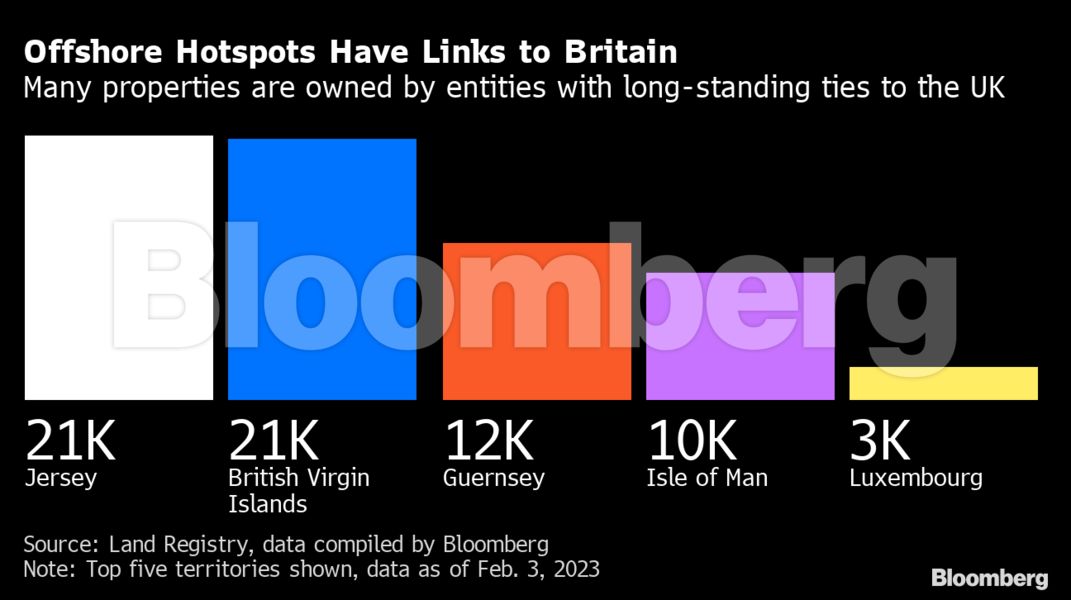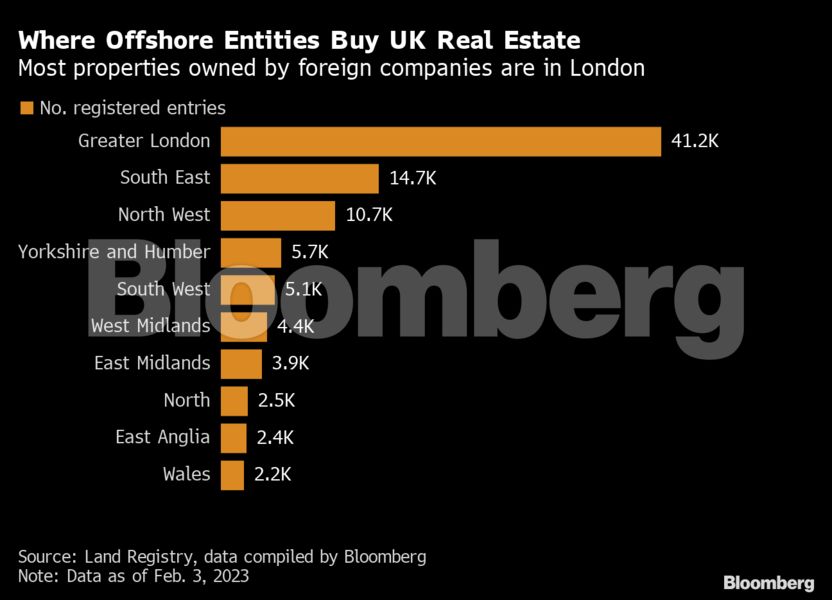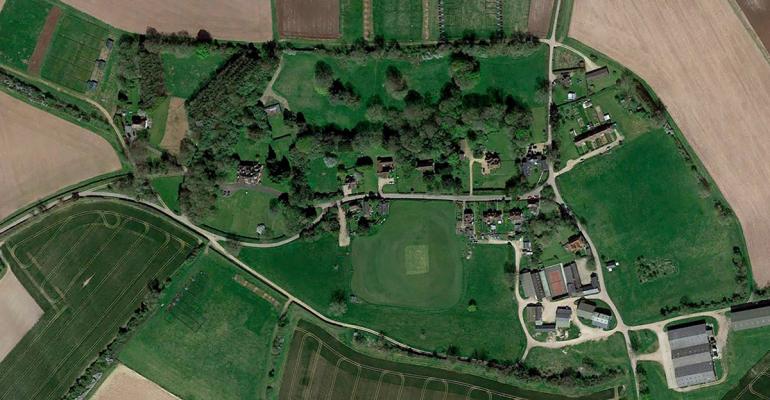(Bloomberg) -- The gated mansions around St. George’s Hill boast sweeping driveways, indoor swimming pools and landscaped gardens, and are closely monitored by CCTV cameras and security staff. There are few hints of who lives there or owns the properties.
Much bigger clues are in the UK’s new register for overseas entities, part of a government effort to bring transparency to Britain’s property market, long a favored haven for the world’s ultra-rich. The register shows where foreign wealth has flowed, including to St. George’s Hill, a 960-acre (388-hectare) enclave near the town of Weybridge, south-west of London.
The register is a major policy shift, requiring overseas companies to declare beneficial owners or face potential prosecution. UK-based entities have been required to disclose similar details since 2016. Though it affects many law-abiding investors, the government has also been explicit that it wants to crack down on money-laundering in the UK property market.
The process has led to property-owning entities incorporated overseas — from the Cayman Islands to Hong Kong and Switzerland — revealing details on their ultimate owners. That provides a rare insight into the cast of royals, billionaires and crypto investors who are among the global super-rich individuals who indirectly own homes in the UK.
In St. George’s Hill, the new register reveals that Russian tycoon Alexander Frolov, 58, a former chief executive of Russian steel group Evraz Plc, bought a property and nearby land in 2008 for £9.8 million ($12 million). He was sanctioned by the UK last year and his assets frozen in response to Russia’s war in Ukraine. The entity that owns the property, Eastcotts Management, joined the register a few days before a Jan. 31 deadline.
Frolov, who has a net worth of about $4 billion, according to the Bloomberg Billionaires Index, also bought an apartment in London’s glitzy Knightsbridge district in 2006 for almost £16 million through Springvale Worldwide, another British Virgin Islands entity. Previously, it didn’t disclose him as its beneficiary — because it wasn’t required to. Springvale filed with the UK’s offshore entities register on Jan. 27, the same day as Eastcotts.
A representative for Frolov declined to comment.
Other billionaires and finance executives also own residences in and around St. George’s Hill, the register shows, and at least one home in the area is on the market for almost £23 million. More widely, the UK is an attractive option for global real estate firms and sovereign wealth funds — some of which have used overseas entities to get into the UK market, the register shows.

“There’s nothing intrinsically wrong with overseas companies owning property in the UK,” government minister Martin Callanan told Bloomberg in an interview on Feb. 1. But “we all have the right to know who stands behind each of those companies.”
Properties long known to belong to Dubai’s ruler Sheikh Mohammed bin Rashid Al Maktoum are listed as being owned by an entity in the UK crown dependency of Guernsey. It holds more than 100 parcels of land and property across southern England. They include Godolphin Stables, part of the Dubai dynasty’s private horse-racing business, as well as a Suffolk estate acquired in 2009 for about £45 million.
Saudi Arabia’s Al Rajhi family, meantime, which founded one of the world’s largest Islamic banks, is named as beneficiary of at least 12 apartments in a luxury southwest London apartment tower, overlooking the River Thames.
Representatives for the Al Maktoum and Al Rajhi families did not respond to requests for comment.
Other registered beneficial owners include the Persson family, the force behind Swedish clothing giant H&M Hennes & Mauritz AB. Family patriarch Stefan Persson, 75, owns more than 45 properties and plots of land in southern England through a Luxembourg entity. They include several farms and a Edwardian manor house in the Hampshire village of Linkenholt, which was recorded in the Domesday Book of 1086. Persson, H&M’s largest shareholder, is worth about $15 billion, according to Bloomberg’s index.
Kristina Stenvinkel, a spokesperson for Persson, said that his entity, Ramsbury Sarl, pays all applicable taxes in the UK and the structure of ownership does not save him any taxes either in the UK or in Sweden.
The register also shows how wealthy British individuals hold domestic real estate through offshore entities. They include James Dyson, the UK’s richest person. Dyson owns more than 30 properties or packets of land across the UK via an entity registered in Singapore, where his namesake technology company is now based. They include Mayfair office buildings and Stone Lake Retail Park in South London, acquired for £45.3 million in 2021, according to England property records.
Each individual property sale was previously available separately via transaction records, but the register consolidates them for the first time, meaning that Dyson properties are now bundled together in the public domain. Overall, Dyson has spent more than £200 million on UK real estate over the past decade, mostly on commercial property in London, according to data compiled by Bloomberg.
Dyson, 75, one of Britain’s biggest taxpayers and owners of farmland, has a net worth of about $16.7 billion through his namesake business.
A representative for Dyson said the Singapore entity doesn’t receive any tax advantages from the arrangements and that it is listed on the register as a result of wanting to comply with regulations. Many of the properties listed are occupied by Dyson businesses, which employ more than 3,000 people in the UK, the representative added.
Read more: James Dyson Builds Family Office Empire for UK’s Biggest Fortune
The register sets the UK on a different course to European Union nations, after the European Court of Justice ruled against public access to registers of beneficial owners within the bloc.
There are legitimate reasons for holding UK property offshore. Rich individuals from nations with high rates of kidnapping, for example, typically use them to allay security fears. Celebrities seek to avoid unwanted media attention.
Offshore ownership also has a “very significant” role in succession planning, said Charlie Maydon Grace, a private client partner at London-based law firm Macfarlanes. The register could easily put a ceiling on their use. “For UK properties, we’ll see a lot less use of offshore companies,” Maydon Grace said in a media briefing.
That prospect is causing some concern. “The UK was right to improve regulation, but the government needs to be careful that it doesn’t make it impossible to invest in this country,” said Trevor Abrahmsohn, managing director of luxury real estate firm Glentree. “We should be working on encouraging wealthy, fragrant investors to the UK.”
Some identities are invisible because they are obscured by trust structures, even on the new register. Watchdog Transparency International identified almost 52,000 properties in England and Wales still owned anonymously via foreign entities, according to a report published on Feb. 7. A high proportion of UK property owners investigated for corruption have in the past abused offshore entities to conceal their identities, the group says.
First mooted in 2016, the UK moved quickly to increase scrutiny of property ownership after Russia invaded Ukraine, and the register was eventually launched in August 2022. It bans non-compliant entities from buying UK real estate and restricts them from selling existing assets. Penalties could range from fines to criminal prosecution.
The UK says it has already helped to identify some dirty money. Ruja Ignatova, a so-called “cryptoqueen” scammer who is on the FBI’s most-wanted list, was recently revealed as the buyer of a Kensington penthouse.
“Britain’s property sector is a magnet for dirty money from around the world,” said Duncan Hames, director of policy at Transparency International UK. The new property transparency rules “should provide fewer places for illicit wealth to hide,” he said.

All of the entities for the people cited above filed with the UK’s register by the Jan. 31 deadline, but enforcement action is starting imminently for those who did not. Callanan, the UK government minister, told Bloomberg that more than 100 employees among British authorities are now overseeing compliance efforts.
Those officials may have plenty of work on their hands. Of 32,440 overseas organizations known to UK authorities, close to 40% did not declare their beneficial owners before Jan. 31, government figures show.
--With assistance from Damian Shepherd.
To contact the author of this story:
Benjamin Stupples in London at [email protected]
© 2023 Bloomberg L.P.





